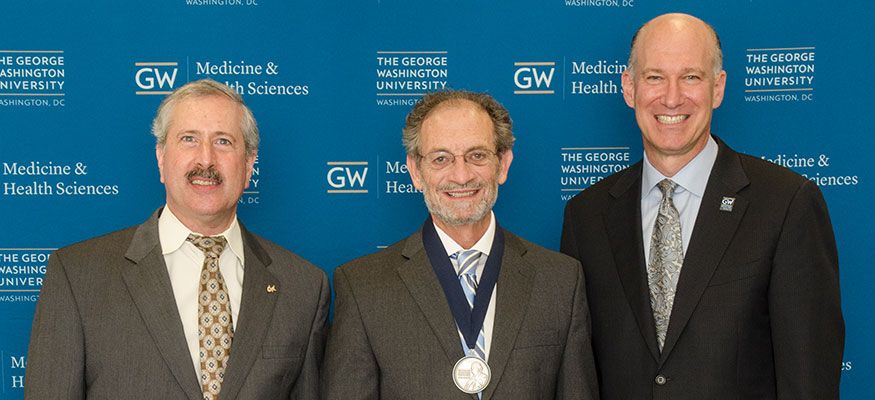
“Doctors are healers. Healing is sometimes about curing disease, but more often it’s about relieving pain and disability,” said James L. Griffith, M.D., chair of the department of psychiatry and behavioral sciences at the GW School of Medicine and Health Sciences (SMHS), as he reflected on his role as a psychiatrist. “Only psychiatry, among the disciplines of medicine, both treats disease and enriches beyond disease to impact other sources of suffering that I saw around me — particularly abuse, neglect, and exploitation of other human beings.” In time, Griffith explained, he would understand his mission was not just to become a healer, but to learn how to teach healing.
Griffith’s reflection came as part of his formal installation as the Leon M. Yochelson Professor of Psychiatry and Behavioral Sciences on Aug. 11. “At no point have I ever considered any job other than teaching at a medical school,” added Griffith, who joins a distinguished group of leaders who have held this title, including Jerry Wiener, M.D., David Mrazek, M.D., and Jeffrey S. Akman, M.D. ’81, RESD ’85, Walter A. Bloedorn Professor of Administrative Medicine, vice president for health affairs, and dean of SMHS.
Established in 1982 by Joseph E. Rankin, M.D. ’46, former clinical professor of psychiatry and behavioral sciences at SMHS, and his late wife Eunice C. Rankin, this endowed professorship honors the career of Leon M. Yochelson, M.D., who created and served as the first chair of GW’s Department of Psychiatry and Behavioral Sciences.
GW Provost and Executive Vice President for Academic Affairs Steven Lerman praised Griffith for the great strides the department has made under his leadership and stressed the importance of these endowed professorships. “These endowments allow us to bring together individuals who are most committed to scholarship, service, and teaching the next generation of students,” he said.
The celebration was particularly special for Akman, who recognized and honored his friend and colleague, describing Griffith as an outstanding academic physician, healer, and humanitarian with exceptional clinical teaching skills and a strong commitment to the department. “I quickly developed a deep admiration for his commitment to education, training and scholarship, as well as his creative efforts to understand and integrate the many disparate and highly complex aspects that make us human,” he said.
Under Griffith’s leadership, the department developed an innovative four-year global mental health track; drew praise for the psychiatry residency program’s curriculum in global mental health, mental health policy and advocacy, psychotherapy training, and psychiatric care for medically ill patients; and provided national leadership in translating basic neuroscience research into humanistic psychiatric therapy.
An advocate for humanism in psychiatry, Griffith stressed that the mentally ill are often discriminated against and stigmatized around the world. He mentioned the work of Michael Morse, M.D., M.P.A., a fourth-year psychiatric resident at SMHS, as an example of the efforts the department is undertaking to combat mental health stigma. “Michael is creating community-based training for Palestinian mental health professionals in Jerusalem,” he said.
Griffith, better known to his friends and colleagues as “Griff,” completed his residency in neurology at the University of Mississippi School of Medicine in 1979. He joined the GW faculty in 1994 and has served as interim chair of the department since 2011. Griffith also serves as a psychiatric consultant for Northern Virginia Family Services in the Program for Survivors of Torture and Severe Trauma.
Other accolades include the Distinguished Teacher Award from SMHS and the 2003 Psychiatrist of the Year and 2014 Distinguished Service Award — both presented by the Washington Psychiatric Society. Most recently, Griffith was selected by Washingtonian Magazine as a 2014 “Top Doctor in Washington.”
“Promoting mental health promotes civil society,” he said. “This becomes our contribution to peace building.”
As a department, Griffith said, “our goals are to engage fully in mental health policy, advocacy, and political action to restore humanity for our patients and to translate neuroscience research into treatment innovations that can relieve the suffering of the mentally ill.”
To lead this department as the Leon M. Yochelson Professor of Psychiatry and Behavioral Sciences is a privilege, says Griffith. “We have mission, which I believe we can accomplish. For this, I continue to work more hours and sleep less than I did when I was a resident.”


